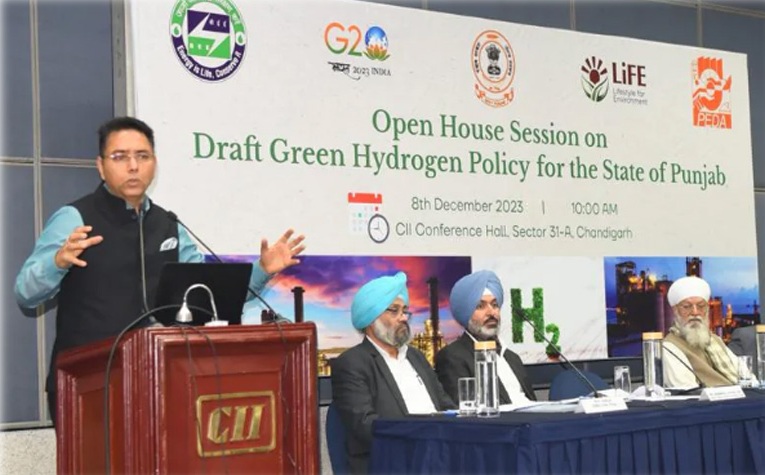Punjab aims to spearhead Green Hydrogen Revolution by 2030

In a visionary move to position Punjab at the forefront of green and clean energy production in India, the state’s New and Renewable Energy Sources Minister recently unveiled ambitious plans for the Punjab Green Hydrogen Policy.
Crafted by the Punjab Energy Development Agency (PEDA), this policy seeks to transform agricultural residues, hitherto considered a liability, into valuable green energy assets.
Speaking at a half-day Open-House Session on the Draft Green Hydrogen Policy at CII, the minister outlined the state’s commitment to becoming a leading Green Hydrogen and Ammonia producer, targeting an impressive production capacity of 100 kilo tons per annum by the year 2030.
The strategy involves harnessing innovative manufacturing capacities, including biomass gasification, steam methane reforming, electrolysis of wastewater, and hydrogen fuel blending.
This initiative aligns with the broader vision of the Chief Minister, who has been actively steering the Punjab Government’s efforts to position the state as the top producer of clean and green energy.
The focus on green hydrogen from biomass is particularly strategic, given the annual generation of 20 million tons of paddy straw in the state.
The Chairman of PEDA, H.S. Hanspal, emphasized the significance of the Green Hydrogen policy, highlighting that it goes beyond mere goals, serving as a testament to Punjab’s commitment to a sustainable future.
CEO of PEDA, Dr. Amarpal Singh, underscored Punjab’s dedication to leading the country in contributing to green fuel for the future. He also shed light on the forthcoming incentives planned under the Green Hydrogen Policy, reinforcing the state’s commitment to both prosperity and national energy security.
Director of PEDA, M.P. Singh, outlined the various initiatives aimed at utilizing paddy straw for conversion into useful fuel and energy, catering to the state’s energy requirements.
Praising PEDA’s initiatives, Prof. Dr. S. Dasappa from the Interdisciplinary Centre for Energy & Research, IISC, Bangalore, and Dr. G. Sridhar, Director General of the National Institute of Bio-Energy, MNRE, GoI, commended the state’s proactive stance in promoting green and clean energy.
A presentation by Dr. S. Dasappa showcased an innovative technology for hydrogen production from biomass, providing a glimpse into the potential avenues that Punjab is exploring. Rohit Kumar from PEDA also outlined the salient features of the Draft Green Hydrogen Policy for the State of Punjab.
The event saw active participation from representatives of prominent industries, including NLT, HMEL, HPCL, GAIL, Indian Oil, NFL, Vardhman, Sportking, Nahar Group, and various industrial associations, consultancy firms, academic institutes, and energy auditors and managers.
As Punjab propels itself into the vanguard of the green hydrogen revolution, these strategic initiatives mark a crucial step towards a sustainable and environmentally conscious future for the state and the nation as a whole.
(Photo and text courtesy: Khalsavox.com)




